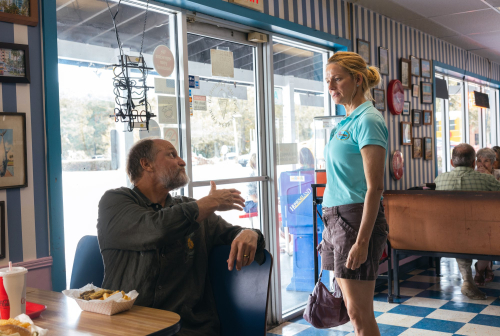
Eric Zachanowich/Searchlight Pictures
MOVIE REVIEW
Suncoast (2024)
End-of-life care becomes an issue on almost everyone's plate one way or another. The dilemma faced by the family in "Suncoast" as they place Max (Cree Kawa), a young man dying of brain cancer, into a hospice will resonate a little or a lot with most people; for this is the art and craft of the medical drama, to which few are fully immune. In this one premiering at the Sundance Film Festival, writer-director Laura Chinn gives the mother of the patient, Kristine (Laura Linney), and her other child, Doris (Nico Parker, daughter of Thandiwe Newton and with some of her mother's wary watchfulness), equal focus in their shared but different grief. So the film is about one parent's agonies and one young woman's coming-of-age at the same time, two films for the price of one. And there's a political dimension, since Ms. Chinn sets her story in 2005 at the same hospice where Terri Schiavo is receiving care, the real-life right-to-die case playing out in the background on all news channels. The tact and delicacy of the film will have much to do with all this being based on experience: the film maker has fictionalized things for narrative purposes, but Ms. Chinn's brother did die in that hospice; it was at that time; and she was that sister.
Doris and her mother are tensely at odds without being estranged, a more realistic dynamic for a family under duress than many a melodrama would have gone for. When Doris tells new friend, Paul (Woody Harrelson), that Kristine "was not a good mom to me," you don't think for a minute that Doris will actually abandon her parent and hit either the mother or the road. And when Kristine is asked by a hospice nurse looking after her son whether she has other children and instinctively answers "no" before correcting herself, aghast at her own response, you don't think she's a monster; Ms. Linney's natural empathy has a lot to do with that. Mother and daughter are buffeted but still afloat. So too, it seems, is Paul, an activist protesting the Schiavo case after the loss of his wife, and who has some religious faith to prop him up.
Avoiding melodrama means that pretty much all the film's characters are, basically, nice. Although Doris's more affluent classmates can be mildly bitchy at first (they only really learn her name when it turns out Doris can host a party at her place), the group forms ranks with her before long; and she duly leans on them right back. Paul, older and hippyish and rooted by grief to a spot on the sidewalk outside a hospital, might have turned out to pose any number of problems for young fatherless Doris; but he's there to witness her achieving the closure that has eluded him, and knows it when he sees it. The soft lilting score by Este Haim and Chris Stracey does as much as any of the film's elements to strike the tone Ms. Chinn is after, one where the film understands its characters without judgment one way or the other.
Comments